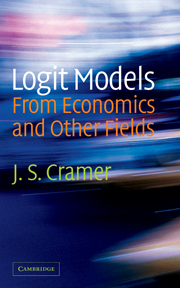Book contents
- Frontmatter
- Contents
- List of figures
- List of tables
- Preface
- 1 Introduction
- 2 The binary model
- 3 Maximum likelihood estimation of the binary logit model
- 4 Some statistical tests and measures of fit
- 5 Outliers, misclassification of outcomes, and omitted variables
- 6 Analyses of separate samples
- 7 The standard multinomial logit model
- 8 Discrete choice or random utility models
- 9 The origins and development of the logit model
- Bibliography
- Index of authors
- Index of subjects
1 - Introduction
Published online by Cambridge University Press: 11 January 2010
- Frontmatter
- Contents
- List of figures
- List of tables
- Preface
- 1 Introduction
- 2 The binary model
- 3 Maximum likelihood estimation of the binary logit model
- 4 Some statistical tests and measures of fit
- 5 Outliers, misclassification of outcomes, and omitted variables
- 6 Analyses of separate samples
- 7 The standard multinomial logit model
- 8 Discrete choice or random utility models
- 9 The origins and development of the logit model
- Bibliography
- Index of authors
- Index of subjects
Summary
The role of the logit model
Logit analysis is in many ways the natural complement of ordinary linear regression whenever the regressand is not a continuous variable but a state which may or may not hold, or a category in a given classification. When such discrete variables occur among the independent variables or regressors of a regression equation, they are dealt with by the introduction of one or several (0, 1) dummy variables; but when the dependent variable belongs to this type, the regression model breaks down. Logit analysis or logistic regression (which are two names for the same method) provides a ready alternative. At first sight it is quite different from the familiar linear regression model, and slightly frightening by its apparent complexity; yet the two models have much in common.
First, both models belong to the realm of causal relations, as opposed to statistical association; there is a clear a priori asymmetry between the oddly named independent variables, the regressors or covariates, which are the explanatory variables or determinants, and the dependent variable or outcome. Both models were initially designed for the analysis of experimental data, or at least for data where the direction of causation is not in doubt. In interpreting empirical applications it is often helpful to bear these origins in mind.
Within this causal context, the ordinary linear regression model offers a crude but almost universal framework for empirical analysis. Admittedly it is often no more than a simplified approximation to something else that would presumably be better; but it does serve, within its limitations, for empirical screening of the evidence. Logistic regression can be used in quite the same way for categorical phenomena.
- Type
- Chapter
- Information
- Logit Models from Economics and Other Fields , pp. 1 - 8Publisher: Cambridge University PressPrint publication year: 2003



